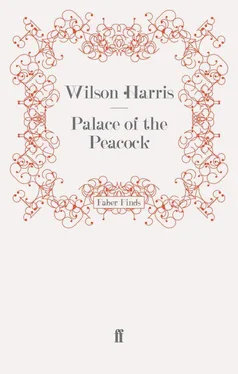In the final paragraph of Palace the reader realises that he is the Dreamer, and the novel he has just read is an exploration of his own journey towards resurrection. Self-knowledge and acceptance. Donne is part of the Dreamer, part of us. The whole crew including Donne are the humanity of the Dreamer come from the past to free him up into complexity. “I felt the faces before me begin to fade and part company from me and from themselves as if the need of one another was now fulfilled, and our distance from each other was the distance of a sacrament, the sacrament and embrace we knew in one muse and one undying soul. Each of us now held at last in his arms what he had been for ever seeking and what he had eternally possessed.”
You may or may not be convinced by the novel’s attempt to take us back to the original moment of creation, to sustainment by the undivided soul and anima in the universe. But its psychological truth is inescapable: the Palace of the Peacock, El Dorado, call it what you will, is inside us.
Wilson Harris was born in 1921 in the former colony of British Guiana. He was a land surveyor before leaving for England in 1959 to become a full-time writer. His exploration of the dense forests, rivers and vast savannahs of the Guyanese hinterland features prominently in the settings of his fiction. Harris’s novels are complex, alluding to diverse mythologies from different cultures, and eschew conventional narration in favour of shifting interwoven voices. His first novel Palace of the Peacock (1960) became the first of The Guyana Quartet, which includes The Far Journey of Oudin (1961), The Whole Armour (1962) and The Secret Ladder (1963). He later wrote The Carnival Trilogy ( Carnival (1985), The Infinite Rehearsal (1987) and The Four Banks of the River of Space (1990)). His most recent novels are Jonestown (1996), which tells of the mass-suicide of a thousand followers of cult leader Jim Jones; The Dark Jester (2001), his latest semi-autobiographical novel, The Mask of the Beggar (2003), and one of his most accessible novels in decades, The Ghost of Memory (2006). Wilson Harris also writes non-fiction and critical essays and has been awarded honorary doctorates by several universities, including the University of the West Indies (1984) and the University of Liège (2001). He has twice been winner of the Guyana Prize for Literature.












